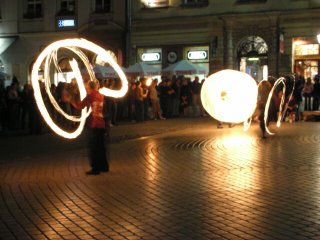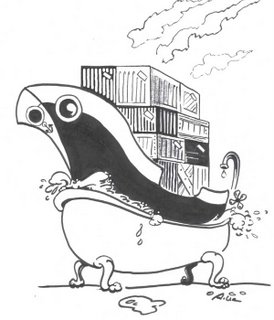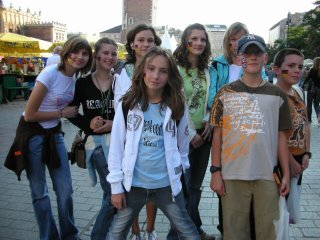 …who have been complaining about my tendency to notice beautiful Krakow women over-proportionately to good-looking Krakow men. This photo of a sweet specimen of all-out maleness, snapped in the upscale shopping mall Galeria Kazimierz, ought to keep you busy for a while.
…who have been complaining about my tendency to notice beautiful Krakow women over-proportionately to good-looking Krakow men. This photo of a sweet specimen of all-out maleness, snapped in the upscale shopping mall Galeria Kazimierz, ought to keep you busy for a while.
75 days in Krakow. On a literary grant from the German Kulturstiftung der Länder. In the Guesthouse of the 16th century Villa Decius, with 10 other writers from Poland, Germany, Belarussia, Ukraine and Georgia. Beautiful city. Nice Krakovians. Fun nightlife. Beautiful women. And in the guesthouse: Meetings of the minds. Too much vodka. Good friends. One of the great pleasures of my life.
Saturday, September 30, 2006
Day #14: Saturday, Sep. 30: This is For All Those Women Out There…
 …who have been complaining about my tendency to notice beautiful Krakow women over-proportionately to good-looking Krakow men. This photo of a sweet specimen of all-out maleness, snapped in the upscale shopping mall Galeria Kazimierz, ought to keep you busy for a while.
…who have been complaining about my tendency to notice beautiful Krakow women over-proportionately to good-looking Krakow men. This photo of a sweet specimen of all-out maleness, snapped in the upscale shopping mall Galeria Kazimierz, ought to keep you busy for a while.
Friday, September 29, 2006
Day #13: Friday, Sep. 29: On the Funkiness of East European Sculpture
 I cannot avoid the subject any longer. I have been challenged to explain why I insist on 1) calling a sculpture "East European" and on 2) calling East European sculptures funky."
I cannot avoid the subject any longer. I have been challenged to explain why I insist on 1) calling a sculpture "East European" and on 2) calling East European sculptures funky." It was Katja, in her comment below and in the background of this photo), who put this challenge to me. To make matters worse, a friend of mine write, in an email to me (he was apparently too cowardly to publish it as a comment. He wrote, somewhat threateningly:
"Noch schreibst du mit ironischer Distanz über die slawische Bohéme. Warte nur bis die östliche Subversion dich von Grund auf - wie man früher gesagt hätte - bolschewisiert haben wird! Erste Anzeichen werden sein: du stellst die Friseurbesuche und das Rasieren ein, und plötzlich verweilst du auffällig länger vor den Pfeifenauslagen von Tabakgeschäften! Weitere Anzeichen: sich anbiedern, in ukrainischen Problembüchern verewigt zu werden - und sei es als sterbendes Kapitalistenungeziefer! Vom Wodka ganz zu schweigen!
"Und soeben lese ich von den haarigen Diskussionen, die unter Autoren, bzw. unter Autorinnen geführt werden. Let me tell you one thing: Wie du siehst, haben wir komplizierten, individuellen und unetikettierten Deutschen/Europäer noch immer das letzte (intellektuelle) Wort - hah! Und was für ein fantastisches Wort! Sag ihr, ich liebe alle sich auf Moleküle berufenden Erklärungen! 1:0 Leipzig vs. Honolulu. Die Zeit ist jetzt gekommen, dass es sich rächt, immer nur Mittelalternovels gelesen zu haben statt die Werkausgabe von Marx/Engels."
I see no other choice but to apply myself herewith to the Funkiness Question.
Here, dear Katja, is my answer:
That sculpture is East European neither because it is in Eastern Europe nor because an Eastern European made it: It has an East European flair (which is very similar to a Scandinavian flair.)
This is clearly a sculpture about the condition of man – run down by the machinery of life, fleeing but taking his burden with him, etc. But at the same time it is pleasing top the eye. Even beautiful. The man portrayed could be flying (or, as my hero Woody once said, falling with style). Eastern Europeans tend to do this kind of thing – they take a drastically depressing background theory and make something out of it that you would be happy to have in your living room. That is how I define funkiness.
The Germans are exactly the opposite: When they make a sculpture about the futility and hardship of life, there's nothing "pleasing" about it. It's all glass shards and barbed wire and blood. You can hear it scream, it's full of tension, pain and depression. When it comes to tension, depression and pain, the Germans are very serious. You don’t want to put that German sculpture in your living room. But you want to abstain from eating or drinking anything for several hours after seeing it.
That's what often makes East European sculpture recognizable. Of course it helped that I asked our babysitter Renate, and she confirmed that the artist was a young East European.
Thursday, September 28, 2006
Day #12: Thursday, Sep. 28: The Shocking Truth About Socialism

Suddenly, this whole question of communism vs. socialism takes on a new, bone-chilling aspect.
You see that bottle "Strong" beer, second from left? That's my beer. Only, it's not really beer anymore. It's the sad, hollow, emptied husk of a beer; the remnants of a beer, the remainder, what's left for the worms to invade when the soul of the beer is gone. Yes, that beer is beer no more. But I – the owner of the beer – did not drink it.
I bought the beer, I transported it form the Supermarket to the house, I stored it in my room until I felt a need to enjoy the beer slowly rising, I placed the beer in the fridge to prepare it for drinking the next day, but when I came down to the kitchen this evening to actually take and enjoy the beer, it was gone. I took everything out of the refrigerator, every item, one by one: the packages of sliced cheese and sliced sausage, the plastic bag with the stalks of parsley in it, the cartons of orange juice and milk, everything, one by one, and when I was done: no beer.
Then I discovered the empty bottle in the corner. Oh, what mockery: the beer thief placed the empty bottle neatly in the corner to be disposed of. Perhaps I am meant to dispose of it myself.
Who could have done such a cruel mean thing? Surely this is the work of a communist. Might I even venture so far as to suggest that it might well have been the work of a Ukrainian-speaking communist?
The question of what is and what is not capitalism has, for me, taken on a new definition: A capitalist is the one who buys the beer with the intent of controlling it; a socialist is the one who wrests control of the beer from the hands of the capitalist.
Wednesday, September 27, 2006
Day #11: Wednesday, Sep. 27: I Am Committed

So, I have made the big decision: I am going to use part of this time to write a novel.
That is, part of a novel: The first fifty pages or so plus the outline. I should be able to get that finished in three months.
I have written novels before: as a kid, mainly, full of ideas about expressing my self and competing with Shakespeare and entering literary heaven. With that in mind, I feel just a tad silly about trying at my age and as an established journalist to write a novel. I have to assure myself that this is not about expressing myself or creating greeat art or any of that crap; it's about depicting my subject in a different way - in a potentially more popular way (more people buy successful novels than successful non-fiction books) - i.e., it's about taking my subject to a larger group of readers (and at the same time being able to takew liberties with my subject that I could not take as a journalist). Telling me that, writing this - this thing - as a novel makes sinse.
The non-fiction book is not lost. Parallel to writing my novel, I continue researching the non-fiction book. Since both the novel and the non-fiction book have the same theme, there is no conflict as far as time goes. And if my energy holds out (and a publisher is interested in the idea), I can publish both the novel and the non-fiction book as companion books: two ways of looking at the sme subject.
I still have a back door to slither out of, of course. If the pages I wrikte her ein Krakow (Krakow, hear my plea) are crap, I just bury it and forget I ever mentioned it. Of course, now that I have declared my intention to the world, if I fail, I will make a fool of myself. So even if I have a back door, the stakes are high.
Wish me luck. Here goes nothing.
Tuesday, September 26, 2006
Day #10: Tuesday, Sep. 26: Capitalism
 Last night was vodka night: A bunch of European writers sitting around the kitchen table drinking, so of course the conversation turned to capitalism. This time, the conversation surprised me. When I claimed, just to get it out in the open, to be capitalist, they disagreed. Not because they think I am a good person, but because I don’t have the money. It turns out I had been misunderstanding the European/German definition of capitalists all this time:
Last night was vodka night: A bunch of European writers sitting around the kitchen table drinking, so of course the conversation turned to capitalism. This time, the conversation surprised me. When I claimed, just to get it out in the open, to be capitalist, they disagreed. Not because they think I am a good person, but because I don’t have the money. It turns out I had been misunderstanding the European/German definition of capitalists all this time:"A capitalist isn't just someone who lives in and agrees with a capitalist system," claimed Erica the Post-Socialist-Feminist. "A capitalist is someone who controls the capital, like Bill Gates. Didn’t you ever read Marx?"
Per this definition, Bill Gates has only been a capitalist since becoming a success, which is when he was able to "control capital." When he was working in his garage, determined to someday control capital, he was not yet a capitalist. Neither was the guy working in the garage next store who failed, though he would have liked to control as much capital as Bill Gates does.
That means a capitalist is someone who is successful in business and a socialist is someone who fails in business. That goes a long way in explaining Germany, where capitalism (even though Germany is a capitalistic country where all socialists wish they had the capital that the capitalists control) is synonymous with evil. If capitalism is morally reprehensible, business success is morally reprehensible, which may be one reason why Germany lives comfortably with 5 million unemployed, an embarrassing economic slump and a long tradition of discouraging innovation.
All of which is, by the way, in my book Planet Germany! In fact, here's My Beautiful German Frolein's illustration for that chapter:

Monday, September 25, 2006
Day #9: Monday, Sep. 25: What's Wrong With This Picture?
 On the Rynek I saw this group of kids walking around with German flags on their cheeks. Patriotism is a good thing, of course, but I wondered if this was a wise way to show it.
On the Rynek I saw this group of kids walking around with German flags on their cheeks. Patriotism is a good thing, of course, but I wondered if this was a wise way to show it. As I passed, however, I noticed they were speaking Polish. That was even more puzzling, so I asked, and it turned out that they were language students of German and English and this was World Language Day.
Sunday, September 24, 2006
Day #8: Sunday, Sep. 24: Intense
 This is Tanja Malarczuk, a Ukrainian autobiographical novelist with three books (collections of short stories and novellas) under her belt at 23, and she is a Xenologist (?), which, she claims, means she can understand languages without learning them. Three months ago she didn't speak English. Then she went to Germany for a visit and everyone was speaking English and she felt frustrated, until a couple of weeks passed and she could suddenly speak English. Just like that. I believe her. (Maybe it helped to have watched a lot of English-language movies all her life).
This is Tanja Malarczuk, a Ukrainian autobiographical novelist with three books (collections of short stories and novellas) under her belt at 23, and she is a Xenologist (?), which, she claims, means she can understand languages without learning them. Three months ago she didn't speak English. Then she went to Germany for a visit and everyone was speaking English and she felt frustrated, until a couple of weeks passed and she could suddenly speak English. Just like that. I believe her. (Maybe it helped to have watched a lot of English-language movies all her life). In this photo she is speaking not English, but a more international language, one far more powerful and widespread than English, and in course you don’t understand what she is saying, this is the translation: Don’t take my picture!
Last night I came down into the kitchen to get a beer before retiring and there was Tanja. Cagey Tanja, who does not like to talk much about herself. Ah, but I knew I would catch her in a talkative mood someday, and today was the day. Finally she talked about her autobiographical novels. "Sometimes I think I am sick," she said. "I think everyone in the world around me is a character in my novel. I could write about you right now and in the novel you would die."
Am I the only one who finds aggressively, intimately personal writing sexy? There is something forbidden about it, like Noah's son Ham seeing him naked. There is something courageous and mad about it, it is the spiritual equivalent of bungy-jumping or of the things they do on "Jackass.".
She said her father will no longer tell her personal things because she wrote about her family in one of her books and they didn't like what she wrote. She's not the kind of writer, I think, who puts a lot of harmony, love, understanding and universal warmth into her books. I get the feeling they are interesting books, though. I understand the heartbreak that her parents felt, but I know also that intimate and true writing can touch countless souls and enrich many lives without her parents ever knowing, and I believe it is worth it and good for her to write those things. Tanja's parents, if you can hear me: forgive her and continue to tell her your secrets; even if it embarrassing for you, it is healing and wisdom-making for people like me.
It would be an honor for me to appear in one of her books. If I die in it, that would be a small price to pay.
Subscribe to:
Comments (Atom)